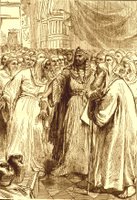Sweet Counsel Gone Sour
Q: About whom was David talking in Psalm 55:14 when he said, “We used to take sweet counsel together”?
A: Forthright conversation with trustworthy friends constitutes an enormous blessing. David’s son Solomon noted in Proverbs 27:9, “Oil and perfume make the heart glad, and the sweetness of a friend comes from his earnest counsel.” Most of us have enjoyed and benefitted greatly from such open, honest relationships. However, many of us also have been victimized by a false friend who either deceived us during “earnest counsel” or who later divulged the secrets of our conversations.
Here in Psalm 55, David said, “We used to take sweet counsel together; within God’s house we walked in the throng.” Note that this relationship was so close that they even went to the Tabernacle together. Yet as he composed these words, the “sweet counsel” was already in the past. This Psalm reveals that the king was betrayed by one with whom he had shared many of his most intimate thoughts and evidently deals with the events surrounding Absalom’s rebellion.
 While Scripture doesn’t mention his betrayer by name, the Aramaic Psalms Targum specifies that David wrote about Ahithophel, who later committed suicide. You can read the history behind the Psalm in 2 Samuel 16:15-17:23.
While Scripture doesn’t mention his betrayer by name, the Aramaic Psalms Targum specifies that David wrote about Ahithophel, who later committed suicide. You can read the history behind the Psalm in 2 Samuel 16:15-17:23.Many theologians treat this whole event as a form of prophetic occurrence (typology), where one historical event actually serves as precursor to a greater event, often involving the life of Christ or His Church. While I’m not sure I agree with treating this narrative typologically, I’ll present the bare bones of this assessment: Under this understanding, David (type) anticipated Jesus (antitype), his greatest Son and his true Lord. Ahithophel (type) was thus a foreshadowing of the great betrayer, Judas Iscariot (antitype). Note that like Judas, Ahithophel, after he “set his house in order,” went and “hanged himself, and he died. (17:23)”
Unlike Judas, who killed himself in remorse over what he’d done, Ahithophel did so because Absalom ignored his advice in favor of Hushai because “the Lord had ordained to defeat the good counsel of Ahithophel, so that the Lord might bring harm upon Absalom. (2 Samuel 17:14)” Another difference is that while Judas was buried in the potter’s field purchased with his returned blood money (Matthew 27:3-10), Ahithophel “was buried in the tomb of his father. (2 Samuel 17:23)”
This Psalm reveals rich treasure for both study and devotion. It comments on the history of Israel and the life of its greatest king. It shows the response of a believer to the peaks and valleys of life and displays complete confidence that God will ultimately set things right: “Cast your burden on the Lord, and he will sustain you; he will never permit the righteous to be moved. But you, O God, will cast them down into the pit of destruction; men of blood and treachery shall not live out half their days. But I will trust in you.”
Art from The Bible and Its Story (1909, Public Domain).
Send email to Ask the Pastor.
Walter Snyder is the pastor of Holy Cross Lutheran Church, Emma, Missouri and coauthor of the book What Do Lutherans Believe.
Technorati Tags: sweet counsel | Psalm 55 | David | Jesus | Ahithophel | Judas Iscariot | typology | type | antitype

0 Comments:
Post a Comment
<< Home